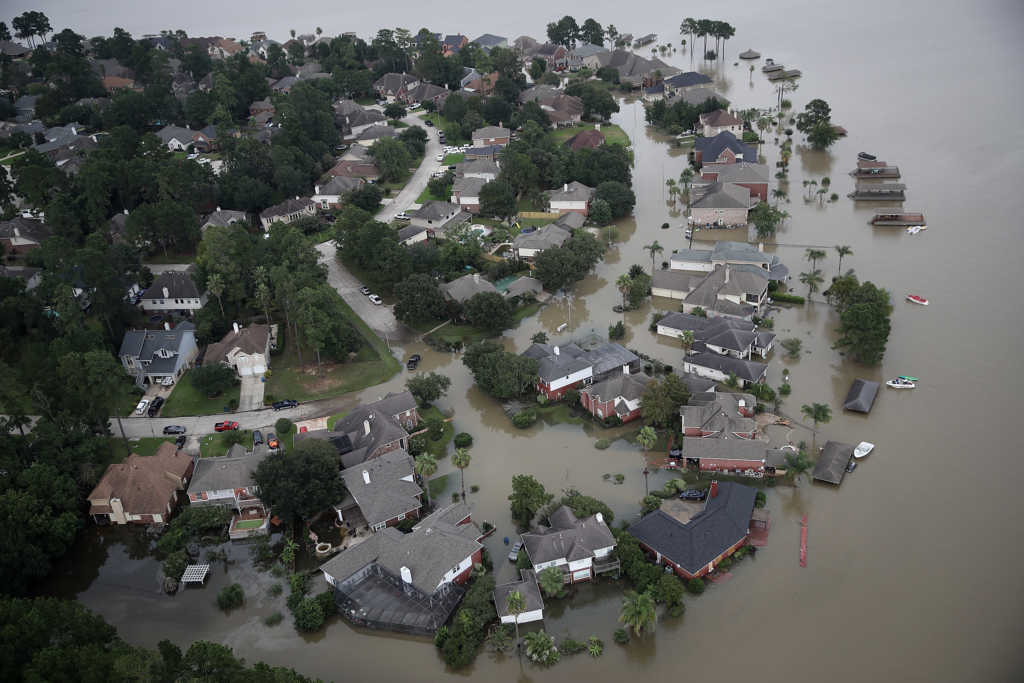Hurricane Harvey was and still is a massive, destructive freak of nature. The U.S. National Weather Service described it as “unprecedented.” Fifty Texas counties were declared state disaster areas due to excessive rainfall — up to 50 inches in some places. And most tragically, at least 46 people lost their lives (so far) and thousands more lost their homes.
Yet when natural disasters like Harvey hit, God gets the blame. No one mentions Mother Nature; it’s the Father’s fault. After all, some insurance policies even call hurricanes “Acts of God.”
So was Harvey an act of God?
Before I tender an answer, forgive me if I ask a few queries of my own that are raised by that question.
First, wasn’t the response of the people of Houston terrific? Rescue workers went above and beyond the call of duty, risking their own lives to save others.
Related: Houston Mattress Guy Has the Best Response to Hurricane Harvey
And normal people rose to abnormal levels of compassion-in-action, rescuing strangers from flooded streets, cars, and homes. In other words, people acted very servant-hearted, very Christ-like. That this happened in today’s culture, ridden as it is with selfishness and animosity—it seems like a miracle to me.
Maybe that’s one way in which God was involved.
Second, why do tragedies sometimes bring out the best in us? To be sure, tragedies strip us of our possessions and our false sense of invincibility. But disasters also do something surprisingly positive: they have a way of leveling the field, as was seen when both haves and have-nots crowded into the same emergency shelters.
The Declaration of Independence claims, “We hold these truths to be self-evident, that all men are created equal…” Well, the equality of humans is seldom seen as clearly as it is when calamity strikes and we lay aside our pet peeves and prejudices to join hands and help one another. In our hyper-divisive and polarized culture, this sounds like a miraculous outcome.
Third, why do tragedies suddenly bring out the God-talk? In my almost-six-decades of life, I’ve noticed that when bad things happen, people who don’t believe in God seem to start talking more about him. Of course, the talk is often crude and blaming, but why use a nonexistent “God” in an angry expletive?
Even more confusing is that this God-talk is happening in our increasingly secular society, where any discussion of God is disallowed from our classrooms to courtrooms to newsrooms. Yet when disasters strike, people start asking the God question: Why would a loving God allow a tragedy like this to happen?
Which brings me to my fourth question: Why do non-religious people feel that Harvey was indeed a tragedy—that is, something that was wrong, an event that should not have happened? If there is no God, no ultimate reason for being, and no transcultural rights and wrongs, can anything really be called tragic?
Yet devastating events like Harvey stir us to think deeply, and our hearts seem to realize that undeserved death and destruction are bad things.
This is odd, since both of the above are maybe the two biggest constants that have happened on planet Earth for billions of years. Think about it: if atheistic materialism is true, don’t you think that we would have become used to death and destruction in 3+ billion years of life on planet Earth? Wouldn’t we have settled the case that hurricanes are regularities rather than tragedies and that human deaths are par for the course?
Here’s the shock: unexpected destruction and death tend to bring the moral indignation out in all of us, atheist and theist alike. Yet if there is no God, the phrase “unexpected destruction and death” is nonsense. Could our moral indignation be a signpost to the existence of a real moral code, based on the character of our creator? Sounds to me like another clue that God is present.
Fifth, when we begin to wonder whether God was behind the hurricane, we must ask: isn’t it a bit risky to assume that we humans can know where God is, much less what God is doing? The Old Testament prophet Elijah expected to find God in a great wind, then an earthquake, and finally in a fire. But God was in none of these events that actuaries call “acts of God.” Instead, God was in a “gentle whisper.”
So was Harvey an act of God?
Like Elijah, it’s common to assume that God is in the really big, very bad stuff like storms, earthquakes, and wildfires. Yet these clearly are common, environmental occurrences in nature. Rather than God, evolutionary naturalism should accept the blame. After all, naturalistic biologists like to credit evolution with the creation of all of the good things in life; shouldn’t they also credit evolution with the bad?
So Harvey was a natural phenomenon, not (as far as we can know) an act of God. It really was a freak of nature.
But God uses such events to remind humans of our higher nature, summons us to sacrifice and put aside our trademark selfishness, and calls us to serve and care for the least among us. For that to happen in 2017, the most rancorous, polarized year in American history—that’s what we can call an Act of God.
—
Dr. Rick Stedman is a collector of classic-rock LPs, bookaholic, author, pastor, and devoted husband and father. He most recent book is “31 Surprising Reasons to Believe in God: How Superheroes, Art, Environmentalism, and Science Point to Faith” (Harvest House, 2017) and he blogs at rickstedman.com.


